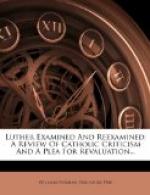The journey of Luther’s mother to Eisleben which compelled her to put up at an inn is, likewise, imaginary. Melanchthon, Luther’s associate during the greater part of the Reformer’s life, investigated the matter and states that Luther was born at his parents’ home in Eisenach during their temporary sojourn in that city, prior to their removal to Mansfeld.
These stories about the place and manner of Luther’s birth originated in the seventeenth century. They were unknown in Luther’s time. Generations after a great man has died gossip becomes busy and begins to relate remarkable incidents of his life. Lincoln did not say or do one half of the interesting things related about him. He has been drawn into that magical circle where myths are formed, because his great name will arouse interest in the wildest tale. That is what has happened to Luther. These “myths” are an unconscious tribute to his greatness. One might let them pass as such and smile at them.
But the Catholic version of Luther’s birth is needed by their writers as a corollary to another “fact” which they have discovered about Luther’s father Hans. Hans Luther, so their story runs, was a fugitive from justice at the time of his Martin’s birth. In a fit of anger he had assaulted or slain a man in his native village of Moehra, and abandoning his small landholdings, he fled with his wife, who was in an advanced stage of pregnancy. Color is lent to this story by the discovery that the Luthers at Moehra were generally violent folk. Research in the official court-dockets at Salzungen, the seat of the judicial district to which Moehra belonged, shows that brawls were frequent in that village, and some Luthers were involved in them. Now follows the Catholic deduction, plausible, reasonable, appealing, just like the “assumption” of Mary: “Out of the gnarly wood of this relationship, consisting mostly of powerful, pugnacious farmers, assertive of their rights, Luther’s father grew.”
This story was started in Luther’s lifetime. George Wicel, who had fallen away from the evangelical faith, accused Luther of having a homicide for a father. In 1565, he published the story under a false name at Paris, but gave no details. In Moehra nothing was known of the matter until the first quarter of the twentieth century. This circumstance alone is damaging to the whole story. Luther was during his lifetime exposed to scrutiny of his most private affairs as no other man. If Wicel’s tale could have been authenticated, we may rest assured that would have been done at the time.
In the eighteenth century a mining official in Thuringia by the name of Michaelis told the story of Hans Luther’s homicide with the necessary detail to make it appear real. Observe, this was 220 years after the alleged event. It had been this way: Hans Luther had quarreled with a person who was plowing his field, and had accidentally slain the man with the bridle, or halter, of his horse. Several Protestant writers




